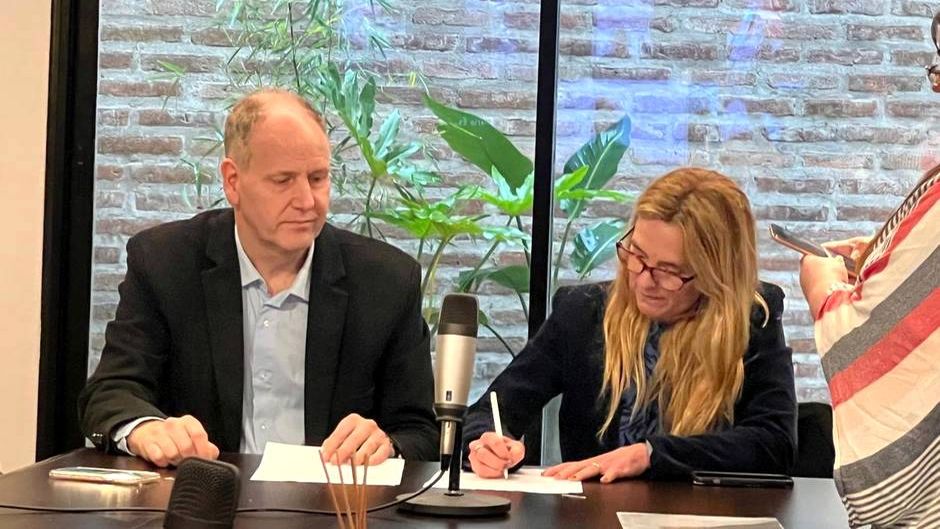Argentina recognises the evangelical work in prisons
The evangelical alliance and the government sign a collaboration agreement. “It is a historic moment because the church has been working in prisons for years”.
Evangélico Digital · BUENOS AIRES · 10 SEPTEMBER 2024 · 14:10 CET

The Christian Alliance of Evangelical Churches of Argentina (ACIERA) has signed a framework collaboration agreement with the Ministry of Security of the nation, to carry out activities and projects aimed to promote the social integration of people deprived of liberty, those released from prison and their families.
The agreement was signed by the president of ACIERA, Christian Hooft, and the national director of Social Reinsertion, Felicitas Beccar, from the Undersecretariat of Penitentiary Affairs.
With the signing of this agreement, the actions and projects will have concrete objectives, work plans, deadlines for their implementation, human, technical and financial resources, as well as any other necessary contribution and specifications required by the plan or project.
Insertion rather than reinsertion
For Hooft, “it is a huge challenge because there are over 1000 people per year who return to freedom, either because they have been granted parole or have served their sentence or for different reasons”.
“We rather talk about insertion than reinsertion, because people who are deprived of their liberty had nothing. If we talk about reinsertion in education, they had no education, if we talk about work, they never had a job. If we talk about family, they never had a family either”, he added.
Hooft pointed out that “along with the National Directorate of Social Reinsertion, we can help to create employment relationships, fraternal care and, above all, faith-based support”.
“Today we have people here who are working in these programmes (...) ready to accept them and tell them: you have an opportunity, a space, people who believe that you can move forward, and that God does this work not thinking about what happened, but with a hope for the future, that you can be a different person, leave the life of crime and drugs behind”.
“This serious work of reinsertion is a historic moment because the church has been working in prisons for years. As ACIERA, we have never officially signed an agreement with the state to work. For us it is a significant recognition, an immense joy to sign this agreement”, underlined Hooft.

Public recognition
Felicitas Beccar thanked the evangelical church for the work it has been doing throughout the country.
“I deeply believe in the mission that you carry out, and for us it is a great network and a support in our work, which sometimes also has its shortcomings and complications, and that if it were not for organisations like you it would be quite incomplete”, she said.
Beccar stressed she was “convinced of what we are doing today with you, we know the work that is done in the prisons and how, when they leave, you shelter them, support them”, and “ready to continue working and learning from you not only about what you do inside the prisons, but also what you do based on faith. Thank you for the opportunity to be part of this journey”.
The framework agreement came into force as soon as it was signed and will be in force for two years. It will be automatically renewed, unless one of the parties informs the other of its intention to terminate it with at least thirty days' notice.
The signing of the agreement
The signing took place in the main hall of the Alliance, where the signatories were accompanied by members of the national board of directors of ACIERA, among them Graciela Giménez, who will be in charge of the coordination and implementation of the agreement.
She was accompanied by the heads of pastoral councils and representatives of the different ministries that have been working for decades in the prisons of the country.

“It is possible to move forward”
Later, during an informal time of conversation, a member of Pastor Giménez's team gave his testimony:
“My name is David Castillo. I spent 17 years in prison. Thanks to the prison caretakersand people who came to visit me, I was able to receive training in prison. I finished primary school, secondary school, I started university.
When I got out and nobody believed in me, not even my family, Pastor Tejeda, the prison director of my prison, told me: here is your chance to change, you can change. Take advantage of all this.
Those were tools that I didn't have when I was a child. When I was little, I did six months of primary school and my dad told me that I had learned to read and write and that was it.
When I got out of prison, the pastors gave me the opportunity to work on a farm and today we work together on social reinsertion.
You can move forward, but you need a whole team of people to be your mentors. You can move forward when there are opportunities and essential tools, and we bear witness of that. The signing of the agreement today is essential”.
One more year
Learn all about our #OneMoreYearEF campaign here (English).
Published in: Evangelical Focus - world - Argentina recognises the evangelical work in prisons
